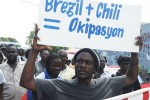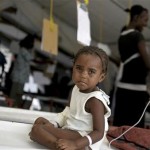Fidel’s Reflexions. Haiti: Underdevelopment and Genocide
By Fidel Castro Ruz
Cuban News Agency
Just a few months ago, on July 26, 2010, Lucius Walker, the head of the American organization Pastors for Peace, at an encounter with Cuban intellectuals and artists, asked me what the solution for Haiti’s problems would be.
Without a second’s delay, I told him:
“In today’s world, there is no solution, Lucius; in the future of which I am speaking, there is. The U.S. is a great food producer, it can feed 2,000 million people, it would be able to build homes that stand up to earthquakes; the problem is the way in which resources are distributed. We have to return even the forests to Haitian territory; but there is no solution in today’s world order.”
Lucius was referring to the problems of this mountainous, overpopulated country, stripped of trees, of fuel for cooking, communications and industries, with a high rate of illiteracy, diseases such as HIV and being occupied by United Nations troops.
“When those circumstances change,” I added, “you yourself Lucius, will be able to take American food to Haiti.”
The noble and humanitarian leader of the Pastors for Peace died a month and a half later, on September 7, at the age of 80, passing on the legacy of the seed of his example to many Americans.
An additional tragedy had not yet appeared: the cholera epidemic which, on October 25, 2010 reported more than 3,000 cases. To such a harsh calamity, add the fact that on November 5, a hurricane ravaged the territory, causing flooding and rivers to overflow.
We must dedicate to this body of dramatic circumstances the attention it deserves.
Cholera appeared for the first time in modern history in 1817, a year in which one of the great pandemics occurred, devastating humanity in the 19th century; it had a huge mortality rate principally in India. In 1826, the epidemic reappeared, invading Europe, including Moscow, Berlin, and London, moving on to our hemisphere from 1832 to 1839.
In 1846, a new even more harmful epidemic was unleashed, striking at three continents: Asia, Africa and America. Throughout the century, epidemics affecting those three regions were repeated occurrences. However, in the course of more than 100 years, taking in almost the entire 20th century, the countries of Latin America and the Caribbean saw themselves freed from this disease, until January 27, 1991 when it appeared in the Chancay Port in northern Peru; first it extended along the Pacific coast and subsequently along the Atlantic seaboard, to 16 countries; 650,000 persons became ill in a period of six years.
Without the least doubt, the epidemic affects much more than poor countries in whose cities overpopulated neighborhoods are massed together, many times lacking drinking water, and the sewers, which are carriers of the Vibrio cholerae that spread the disease, pour into the drinking water.
In the special case of Haiti, the earthquake destroyed the water and sewer network wherever they had existed, and millions of people live in tents that often even lack latrines and everything gets mixed up together.
The epidemic that affected our hemisphere in 1991 was the Vibrio cholerae 01 biotype El Tor Ogawa serotype, exactly the same one that penetrated Peru that year.
Jon K. Andrus, Associate Director of the Pan American Health Organization, informed us that the bacterium that was present in Haiti was precisely that.
From it derived a series of circumstances to bear in mind, which at an opportune moment will determine important considerations.
As we know, our country has been educating excellent Haitian medical doctors and providing health services in that sister country for many years now. There were very serious problems in that field and we were moving forward, year after year. Nobody could imagine, since there was no history of it, that there would be an earthquake that would kill more than 250,000 persons and cause innumerable wounded and injured. In the face of that unexpected blow, our internationalist doctors pitched in with greater zeal and tirelessly dedicated themselves to their work.
In the midst of the harsh natural disaster, barely a month ago, the cholera epidemic broke out with a fury; and as we have already stated, in such unfavorable circumstances, the hurricane struck.
Faced with the serious nature of the situation, the United Nations Under Secretary General for Humanitarian Affairs, Valerie Amos, yesterday declared that 350 doctors and 2,000 nurses were needed to battle the disease.
The official made a call to extend the aid further than Port-au-Prince and revealed that supplies of soap and clean water were only reaching 10 percent of the families living outside of the capital, without indicating how many were being reached in that city.
Different U.N. officials were lamenting the fact, in the last few days, that the response from the international community to the call made for aid to confront the situation was not even reaching 10 percent of the $164 million urgently being requested.
“Amos called for a swift and urgent reaction to prevent more human beings from dying of cholera,” informed a news agency.
Today another agency communicated that the number of Haitians who have died has now reached “1,523 persons, 66,593 have been cared for, and more than a million inhabitants are still sleeping in public squares.”
Almost 40 percent of the sick have been looked after by members of the Cuban Medical Brigade, which has 965 doctors, nurses and technicians who have managed to reduce the number of dead to less than 1 for each 100. With that level of care the number of dead should not reach 700. As a norm, the people dying were extremely weakened by malnutrition or other similar causes. Children who are detected on time, generally do not die.
It is of vital importance that we avoid the epidemic extending to other countries in Latin America and the Caribbean because, in today’s circumstances, this would cause extraordinary harm to the nations in this hemisphere.
We urgently need to seek efficient and rapid solutions in the fight against that epidemic.
Today the Party and the Government of Cuba made the decision to reinforce the Cuban Medical Brigade in Haiti with a contingent of the Henry Reeve Brigade, made up of 300 doctors, nurses, and health technicians that would add up to more than 1,200 collaborators.
Raul was visiting other regions of the country and was informed in detail about everything.
The people of Cuba, the Party and the Government, are once again measuring up to their glorious and heroic history.
Source: Cuban News Agency







Comments
Fidel’s Reflexions. Haiti: Underdevelopment and Genocide — No Comments